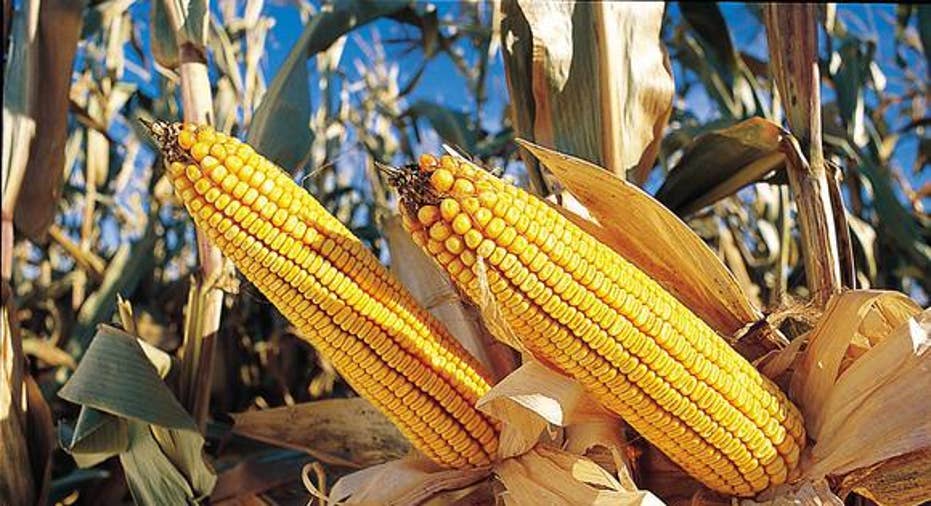Monsanto Wilts as Seed Sales Fail to Take Root

Image source: Monsanto.
Agriculture is a cyclical business, and the companies that support farming have to deal with the ups and downs of the industry. Monsanto has a long history of working with agricultural producers to boost yields and come up with valuable innovations, and its success is a big part of what spurred rival players like DuPont to enter the agricultural chemical and productivity arena. Coming into Wednesday's fiscal second-quarter report, Monsanto investors knew that they were going through a tough part of the business cycle for agriculture, and were prepared for substantial declines in the top and bottom line. But the extent of the pullback was surprising even for those investors. Let's look more closely at the latest from Monsanto and what it says about the industry's future.
Monsanto can't start growing againMonsanto's fiscal second-quarter results continued the negative trends that investors have gotten used to seeing lately. Revenue dropped 13% from the year-ago quarter to $4.53 billion, falling short of the $4.76 billion consensus figure among investors following the stock. Net income fell by a quarter to $1.06 billion, and that produced adjusted earnings of $2.42 per share. That was $0.02 less than investors had expected.
Looking more closely at Monsanto's results, the company's segments were universally weak. The key seeds and genomics segment saw sales drop by 9% to $3.82 billion, with double-digit percentage hits on the corn, soybean, and other-crops product lines. Only the cotton-seed arena posted a sales increase, and it makes up less than 1% of the total seed-related revenue Monsanto brings in. pretax operating results fell by $325 million from last year's fiscal second quarter, weighing in at less than $1.50 billion. Monsanto's other main segment, Agricultural Productivity, suffered a 30% sales hit to $715 million, and the company saw pretax profit evaporate almost entirely to just $7 million for the quarter.
Margins also remained under pressure. Gross margins fell a percentage point to 57%, and net income margins took an even bigger hit, dropping four points to 23% on a 7 percentage point hit to pretax operating margin.
CEO Hugh Grant didn't waste much time talking about the past. "We continue to have a strong growth plan," Grant said, "backed by our commitment to delivering value to our customers through the industry's most proven integrated pipeline." The CEO also expressed his confidence in the immediate and long-term future.
How can Monsanto spring forward?The problem that Monsanto faces is that it has had to rein in expectations in the past. In March, the company slashed its full-year earnings guidance to between $4.40 and $5.10 per share, down from its previous range of $5.10 to $5.60 per share. At the time the company cited weak economic conditions and low crop prices, along with the ongoing negative impact of a strong U.S. dollar. Monsanto confirmed its lower guidance in the earnings release, but it also updated its as-reported guidance to $3.72 to $4.48 per share, citing restructuring expenses.
In the long run, Monsanto still has confidence in its prospects. The company believes that earnings per share should rise by a percentage in the mid-teens annually through fiscal 2019, as it looks for improving conditions and innovation in the corn and soybean areas to drive results. Soybean-related innovations like the Intacta RR2 Pro and Roundup Ready 2 Xtend products are seeing stronger demand in South America and in the U.S., and Monsanto has high hopes for them and other traits in the future.
Still, Monsanto will face competition. DuPont recently agreed to develop modified seeds in a partnership with a Chinese seed producer, further developing DuPont's decades-long relationship with the emerging market. With Chinese officials encouraging further development for its agricultural industry, Monsanto will have to work hard to keep DuPont and other competitors from taking away market share.
Monsanto shares initially reacted negatively to the news, falling in premarket trade immediately after the announcement, but the stock quickly recovered to trade close to unchanged in the first half-hour of the regular session. Going forward, Monsanto needs to make the most of opportunities that arise in the struggling ag market. If it does, though, Monsanto's long-term prospects still look promising.
The article Monsanto Wilts as Seed Sales Fail to Take Root originally appeared on Fool.com.
Dan Caplinger has no position in any stocks mentioned. The Motley Fool has no position in any of the stocks mentioned. Try any of our Foolish newsletter services free for 30 days. We Fools may not all hold the same opinions, but we all believe that considering a diverse range of insights makes us better investors. The Motley Fool has a disclosure policy.
Copyright 1995 - 2016 The Motley Fool, LLC. All rights reserved. The Motley Fool has a disclosure policy.



















